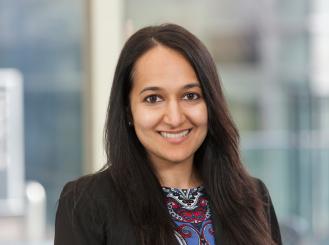Mar 12, 2024
An endowed grant from Conquer Cancer provided Dr. Menghrajani with protected research time in the lab. It also inspired her to pursue leadership and public service opportunities in cancer care.
By Jimmy O’Hara, Conquer Cancer
When Kamal Menghrajani, MD, received a grant from Conquer Cancer, the ASCO Foundation, in 2018, the achievement set in motion her path toward yet another major accomplishment: her appointment as a 2023-2024 White House Fellow.
Working as part of the Biden Cancer Moonshot, Dr. Menghrajani helps to prioritize and improve cancer prevention, screening, and treatment for patients across the U.S. Her initial Conquer Cancer grant, an Endowed Young Investigator Award (YIA) funded in memory of Sally Gordon, enabled Dr. Menghrajani to merge her early-career interests in cancer genomics and public health. By providing critical support and resources early in her career, the grant enabled her to stay in the field and maintain research momentum, and inspired Dr. Menghrajani to pursue national public service roles in oncology and cancer care.
“I had a long-standing interest in public health, and I found a way to combine that with my clinical interest in leukemia by studying clonal hematopoiesis, where I was able to use population health methods to study cancer genomics,” said Dr. Menghrajani of her decision to pursue public policy work, including the White House Fellowship. “I began to wonder about other avenues through which I could combine public health and oncology, and that made me think about working with federal health agencies to help drive systemic change at a policy level.”
A Clinical Trial, Invaluable Experience, and Moonshot Opportunity
Patients with acute myeloid leukemia (AML) have limited options for treatment. KMT2A-rearranged AML, a leukemia subtype caused by mutations in the KMT2A gene, comes with unique concerns: its biology is well understood, but targeted therapies are scarce. Dr. Menghrajani had promising ideas for advancing the leukemia treatment landscape and overall cancer outcomes for patients with this disease.
“I wanted to see if we could advance the [AML] field through genomic studies and a novel, early-phase clinical trial,” she said.
Supported by her YIA funding, Dr. Menghrajani helped launch a clinical trial for patients with relapsed or refractory AML. Guided by her mentors at Memorial Sloan Kettering Cancer Center, Eytan M. Stein, MD, and Martin S. Tallman, MD, she tested the effectiveness of combining pinometostat with azacitidine. Although the trial did not result in favorable data, Dr. Menghrajani gained invaluable research experience that paved the way for subsequent studies.
“Even though the trial did not yield a positive result, I learned a lot from the work and received the time and space I needed to continue my professional development as a researcher,” said Dr. Menghrajani. “Early funding is critical to the success of junior investigators in oncology research.”
From the Lab to the White House
Determined to make an impact on public policy, Dr. Menghrajani applied for and received a 2023-2024 White House Fellowship. Through this program, she works as part of the Biden Cancer Moonshot, collaborating with oncology professionals across the U.S. to help improve treatment and outcomes for patients. She draws from her own research to help guide decision-making and policy initiatives related to prevention, early detection, treatment protocols, and supportive care for patients and their loved ones.
“Cancer is a national priority, and we must be united in continuing our work to eradicate it. The Biden Cancer Moonshot is a transformational opportunity for the country to end cancer as we know it,” said Dr. Menghrajani. “This program is working on the prevention, screening, and treatment of cancer while centering on the patient, family, and caregiver experience.”
Along with gratitude for her time as a White House Fellow, Dr. Menghrajani feels a strong call to work with patients and families in clinical settings. After her fellowship concludes, she plans to refocus on providing care for patients with leukemia and individualizing care plans informed by research. Having financial support early in her research career helped to make these next steps possible.
“The Conquer Cancer YIA gave me the time and space to think about what my unique interests were, and having protected time for research allowed me to formally study public health and to contemplate how I could serve the public as an oncologist,” said Dr. Menghrajani. “The treatment and care options we have today are improving but are still not enough, and we need to push forward for patients.”

